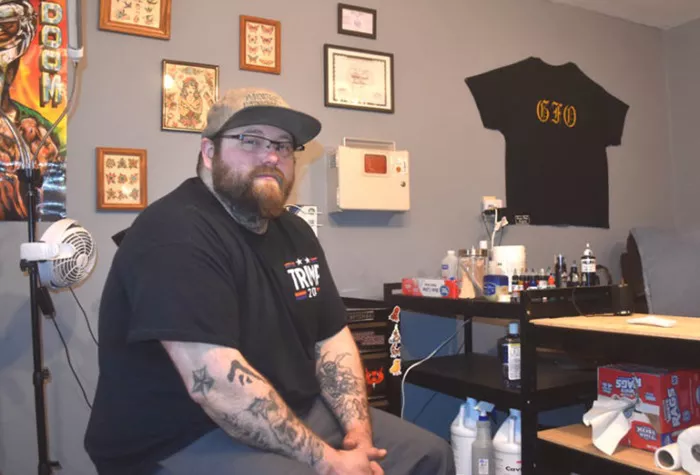The Trump administration is facing increasing scrutiny over its controversial reliance on tattoos as a primary factor in deporting alleged gang members, particularly among Venezuelan migrants. The issue gained traction following the arrest of Daniel Ramirez Medina, a DACA recipient detained in Seattle in 2017. Immigration agents claimed that Ramirez, who had a five-point star tattoo on his forearm, was a gang member based solely on his tattoo. Despite being protected under DACA, Ramirez spent six weeks in detention before a judge ruled that the tattoo merely referenced his Mexican hometown.
This case was a precursor to a broader strategy adopted by the Trump administration, which escalated the use of tattoos as evidence for deportation in the years that followed. Critics argue that this approach undermines established law enforcement protocols, particularly those that caution against using tattoos as definitive proof of gang affiliation. Joseph Kenny, Chief of Detectives for the New York Police Department, emphasized that tattoos should be seen as initial indicators, not conclusive evidence.
The controversy has intensified with the arrival of Tren de Aragua, a Venezuelan gang responsible for violent crimes across the Americas, and its expansion into the U.S. In February 2024, reports indicated that members of the gang were moving from Colorado to the East Coast. While law enforcement authorities continue to link the gang to a range of criminal activities, many experts are wary of using tattoos as the sole evidence for deportation. Tattoo culture in Venezuela is widespread, particularly among young men from impoverished backgrounds, which makes it difficult to conclusively link tattoos to gang affiliation.
A government document titled the “Alien Enemy Validation Guide” has sparked additional concern. The guide includes a points-based system for determining gang membership, with significant weight given to tattoos. For example, a person could accumulate points for tattoos linked to Tren de Aragua or for wearing the gang’s insignia. If a person accumulates eight points, they could be classified as a gang member and face deportation. This scoring system has drawn criticism for being overly simplistic and prone to errors.
In one notable case, Andry Jose Hernandez Romero, a Venezuelan makeup artist, was deported to El Salvador based on his tattoos, which he insists were unrelated to gang affiliation. His legal team argues that the government failed to provide substantial evidence of his ties to Tren de Aragua. Such cases are part of a growing concern about the fairness and transparency of the deportation process, especially as immigration enforcement has increasingly relied on dubious methods like tattoo-based identification.
Adding complexity to the situation, a recent Supreme Court ruling granted detainees the right to hearings before deportation, which could challenge the administration’s approach. The ruling has the potential to reshape the way immigration authorities handle deportation cases, ensuring a fairer process for those facing removal.
Meanwhile, a secret National Intelligence Council report contradicted President Trump’s claims that Tren de Aragua operates under the direct orders of Venezuelan President Nicolás Maduro. The assessment acknowledged that while there are some low-level interactions between the gang and the Venezuelan government, it found no evidence of coordinated operations between the two. This revelation challenges the administration’s justification for deporting alleged gang members under the Alien Enemies Act, which allows for the removal of foreigners from countries at war with the U.S.
On April 12, 2025, reports emerged from El Salvador of Salvadoran prison guards escorting deported members of Tren de Aragua and MS-13 to the Terrorism Confinement Center in Tecoluca. This incident underscores the administration’s aggressive stance on immigration and its willingness to bypass due process in the name of national security.
Legal experts are calling on the Trump administration to reconsider its interpretation of the Alien Enemies Act, which has been invoked to justify the deportation of gang members like those allegedly linked to Tren de Aragua. Critics argue that this interpretation is overly broad and legally tenuous, leading to the wrongful deportation of individuals without sufficient evidence.
As the administration faces mounting legal challenges, including rulings from the Fourth U.S. Circuit Court of Appeals, which ordered the return of a deported man granted protection from gang violence, the future of tattoo-based deportations remains uncertain. U.S. Circuit Judge J. Harvie Wilkinson has urged the administration to ease its confrontational approach with the judiciary, which has become increasingly involved in reviewing deportation cases.
The reliance on tattoos as a primary factor in deportation decisions has raised serious concerns about due process and fairness. Legal experts argue that this method oversimplifies the complex issue of gang affiliation and risks unfairly targeting vulnerable individuals. As the debate continues, the U.S. faces a growing need for a more nuanced, evidence-based approach to immigration enforcement—one that balances national security with the rights of individuals.
In conclusion, the intersection of immigration policy, law enforcement practices, and individual rights is fraught with challenges. The Trump administration’s tactics raise significant questions about the future of deportation policies and the fairness of the immigration system. As the U.S. continues to grapple with national security concerns, a more just and transparent approach to immigration enforcement will be critical in addressing the broader issues at play.
Related topics:

